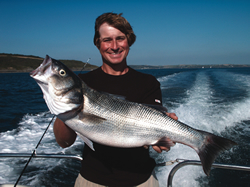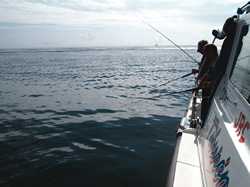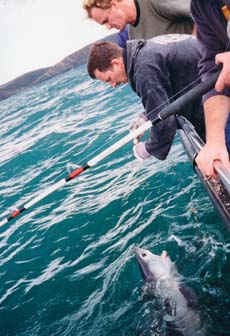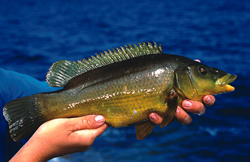It’s official - Recreational Sea Angling is a part of the marine fisheries sector!
In Get Hooked 2005, I covered some of the recommendations to Government from the Prime Minister's Strategy Unit outlined in a report called 'Net Benefits'. The Government have now responded to the recommendations with their publication of Securing the Benefits [visit: www.defra.gov.uk/fish/sea/pdf/securingbenefits.pdf ] and here is an extract:
The following aims and objectives have been adopted by the Fisheries Administrations in the UK:
Aim
A fishing sector that is sustainable and profitable and supports strong local communities, managed effectively as an integral part of coherent policies for the marine environment.
(The 'fishing sector' in this instance means all aspects of catching, processing, retail and associated industries that rely on wild-fish catch, including shellfish. This includes the recreational sector.)
And within the list of objectives are:
Objectives
To secure the management of fish stocks as an important renewable resource, harvested to optimise long term economic returns
To help achieve these objectives we will:
Regulate fisheries effectively with the full involvement of stakeholders
Develop policy based on the best available biological, economic and socio-economic evidence
It is too early yet to gauge how the inclusion of Recreational Sea Angling (RSA) will translate into actual management measures to specifically meet the requirements of sport fishing but if future policies are to adequately reflect RSA needs, RSA will have to take responsibility for engaging with DEFRA in a far more meaningful way than it has done historically. It is critically important for all players in the RSA sector (anglers, tackle shops, tackle manufacturers, bait suppliers, boat builders, chandlery suppliers, marina operators, guides, charter boat operators, angling media etc.) to collectively resource such representation to represent anglers from across all regions of the country.
As I write this piece for Get Hooked 2006, the first management proposal being considered as a result of RSA representation is hot news. The proposal to increase the size at which bass can be retained was made possible by the Prime Minister's Strategy Unit report, 'Net Benefits that drew attention to the economic contribution of RSA. The Bass Anglers Sportfishing Society (BASS), supported by the National Federation of Sea Anglers (NFSA) and the Sea Anglers Conservation Network (SACN) provided DEFRA with a package of evidence to support an increased minimum landing size for bass as one measure towards restoring the availability of older and larger bass. A decision from DEFRA will no doubt be made in the near future.
One worrying issue that the media coverage of the consultation revealed, was the apparent perception that inshore bass stocks have always consisted of small immature fish and that large adults have always been scarce. It is as though the deterioration of our fish stocks has been so long term that the current generation of anglers and fishermen have lost sight of just how good things use to be.
It is almost as though we have become 'conditioned' to perceiving the current level of inshore fish stocks is normal and acceptable. Catches of half a dozen plaice to over 2 lbs. from specific shore marks in the spring, turbot of 20 lbs+ from inshore boat marks, shore caught pollack to 12 lbs and shore catches of bass that frequently included 5, 6, 7 lb and bigger bass, all seem like 'fiction' to many of today's anglers. But I'm not that old! I was fortunate to witness far more abundant fish stocks and consequential sea angling quality in the 1970's.
There are a multitude of complex issues which require biological, economic and social expertise.
What type of issues do I mean?
How about No Take Zones? Imagine a pro
How about a Fisheries Management Plan for some of our larger estuaries such as the Taw/Torridge, Exe, Tamar or Fal & Helford. Would sea anglers want a voice?
What do anglers feel about the increased targeting of wrasse and flounder for pot bait? The number of pots being deployed continue to rise and traditional bait such as gurnards are becoming popular as food, fetching higher prices. Fishermen are looking elsewhere for pot bait and wrasse & flounder are taking the punishment.
Last year an East coast fish merchant announced plans to supply Asia with tope fins. Tope were destined to become the next candidate for serious commercial effort and many anglers will recall what happened to spurdog stocks when they became seriously targeted in the early 1980s. Fortunately, similar plans for tope have been shelved for the moment.
Access to piers and other popular angling venues continue to be threatened. Bait digging issues are never far away. How are small boat owners catered for with launching facilities and parking for trailers and tow vehicles in the South West?
These issues and many others related to the decline and restoration of fish stocks, as well as more general concerns about our coastal environment are frequently the subject of conferences and work shops between many stakeholders including: non governmental organisations, statutory agencies, fisheries managers, politicians, scientists etc... This dialogue informs society's attitudes which guides the decision making process. If recreational sea anglers want to exert their influence, we need to be present at the table, and there are a lot of tables! Sea angling will need high quality and effective representation capable of participating and here is the crunch. Full time professional representation will require money.
In many parts of the globe, sea anglers have got their act together, collectively providing sufficient resources in order to employ professional full time representation. And there are many success stories to show that it works:
• The prohibition of all entanglement netting in Florida's State waters did not just happen. It was the outcome of professional sea angling representation, educating the decision process and all those who participate in it about the socio-economic value of RSA.
• The management of Barramundi in Northern Territories, Australia as primarily an angling resource.
• Restricting commercial fishing for striped bass in Massachusetts to hook & line only and getting all commercial fishing for the species bought to an end in the States of Connecticut and New Jersey.
• Getting Red Drum managed for sport fishing in Texas.
A cultural change is needed within the entire fisheries management regime. The wellbeing of our public fishery resources must take precedence over and above the short term concerns of exploiters. “Fish first –People second” became the catch phrase of Doug Kidd, Ex Fisheries Minister of New Zealand who reversed failing fisheries management between 1992 and 1998.
It is perhaps the 'public ownership' of our oceans and fish stocks that needs the most urgent recognition. Don't we have a responsibility to future generations to leave fish stocks as healthy as we found them? We are patently failing to do so at present.
One of the main regulatory regimes that RSA has to 'inform' is the Sea Fisheries Committees. Half of the committee are appointed by DEFRA and half are County Councilors. How well informed are the Councillors about the socio-economic benefits of sea angling? How many understand the linkage between tourism and a good angling experience? South West tourism recently announced that one of the growth areas of tourism is short breaks, linked to rural activities like angling.
Let's be clear, this debate is not about ending commercial fishing. Many very valuable fish species to the commercial sector are of no direct interest to RSA. Commercial fishing is part of the Cornish heritage and just as with RSA, also provides significant socio-economic benefits. It's about modifying the current management approach so that RSA is better understood and its potential recognised, so that management measures for important angling species take full account of RSA. Decision makers, including Councillors need to appreciate how angling is an activity similar to golf, sailing or diving, in the sense that it is a hobby/pastime activity on which participants are willing to spend significant amounts of their disposable income.
Almost a quarter of a million South West residents are sea anglers and they spend £110 million on their sport. Additional revenue stream of some £55 million comes from visiting anglers, so that the total spend is £165 million. Up to the present time the tourism potential has gone largely unrecognised. The social benefits are also enormous and in today's pressured society, many of us need a passion to become immersed in. For some it is rugby, cricket, sailing, gardening, bird watching, gig rowing and so on, BUT for 250,000 of us, it is sea angling!
In a study about commercial fishing in the South West, funded by Pesca and South West RDA, published in 2003, a list of the top twenty species by value to commercial fishing represented 90% of all landings put at £73 million. Of these twenty commercial species, that include scallops, cuttle, lobsters and monk etc., only eight are of interest to angling and their value as landings amounted to £15 million. This £15 million worth of fish are then transported, processed, marketed and the study suggests the value to the SW economy of fish landed into the SW is possibly three times the landing value, so total value would be £45 million.
So, we have a number of marine species, such as pollack, plaice, cod, bass, rays, etc. that are jointly targeted by commercial and recreational fishing for which the value to the SW economy is £45 million. Simultaneously, another user stakeholder activity – RSA – dependent on the same public resources, generating £165 million worth of value from them with far less negative impact upon those resources, is routinely overlooked. Is it any wonder that an increasing number of sea anglers and those whose businesses are supported by sea angling are less than happy with the situation?
Sea anglers are not suggesting these jointly targeted species are all no longer commercially targeted, all we ask is that the management objectives take full account of the specific requirements of RSA and that commercial exploitation be subject to appropriate restrictions so that the full potential of RSA can be realized in order to generate the optimal benefits to the SW economy.
Essentially, why shouldn't society use its natural renewable resources on a sustainable basis in order to provide the best socio-economic benefits?
Malcolm Gilbert

 The skipper turns on his electronic fish finder and a huge mark appears on the screen indicating the fish that are beneath the boat. The boat is carefully positioned and a command is yelled from the wheelhouse "down you go boys". This is it!! Whilst concentrating on your own tackle you can't help but notice somebody to the rear of the boat is shouting. His rod slams over, contorted by a hard fighting fish!! Then another anglers rod bends over, and another, and another until finally it's your turn. Your rod is almost wrenched from your grip and bends as if about to break!! You play the fish savouring the fight all the way to the surface. The skipper nets your catch and places it carefully down so as not to damage it. You triumphantly hold your capture and have your picture taken - a moment saved forever.
The skipper turns on his electronic fish finder and a huge mark appears on the screen indicating the fish that are beneath the boat. The boat is carefully positioned and a command is yelled from the wheelhouse "down you go boys". This is it!! Whilst concentrating on your own tackle you can't help but notice somebody to the rear of the boat is shouting. His rod slams over, contorted by a hard fighting fish!! Then another anglers rod bends over, and another, and another until finally it's your turn. Your rod is almost wrenched from your grip and bends as if about to break!! You play the fish savouring the fight all the way to the surface. The skipper nets your catch and places it carefully down so as not to damage it. You triumphantly hold your capture and have your picture taken - a moment saved forever.

 The diverse South West shore line has a wealth of opportunities to be enjoyed by the angler. Sadly the coastline has also been the location for several angling related tragedies over recent years. The sea can give great pleasure but can be cruel and unforgiving if not treated with due respect.
The diverse South West shore line has a wealth of opportunities to be enjoyed by the angler. Sadly the coastline has also been the location for several angling related tragedies over recent years. The sea can give great pleasure but can be cruel and unforgiving if not treated with due respect. Moving on from mackerel and garfish, I reckon the next step up is to start fishing for the bottom dwelling ballan wrasse that are usually fairly plentiful around much of our coastline. Again these fish can often be caught from the above kind of places, but bear in mind that the wrasse is a bottom feeder and tends to live where there are rocks and broken ground. Happily lots of headlands, piers and breakwaters are still worth fishing from, although the biggest wrasse tend to be caught from more out of the way places…..that though is for another time.
Moving on from mackerel and garfish, I reckon the next step up is to start fishing for the bottom dwelling ballan wrasse that are usually fairly plentiful around much of our coastline. Again these fish can often be caught from the above kind of places, but bear in mind that the wrasse is a bottom feeder and tends to live where there are rocks and broken ground. Happily lots of headlands, piers and breakwaters are still worth fishing from, although the biggest wrasse tend to be caught from more out of the way places…..that though is for another time.